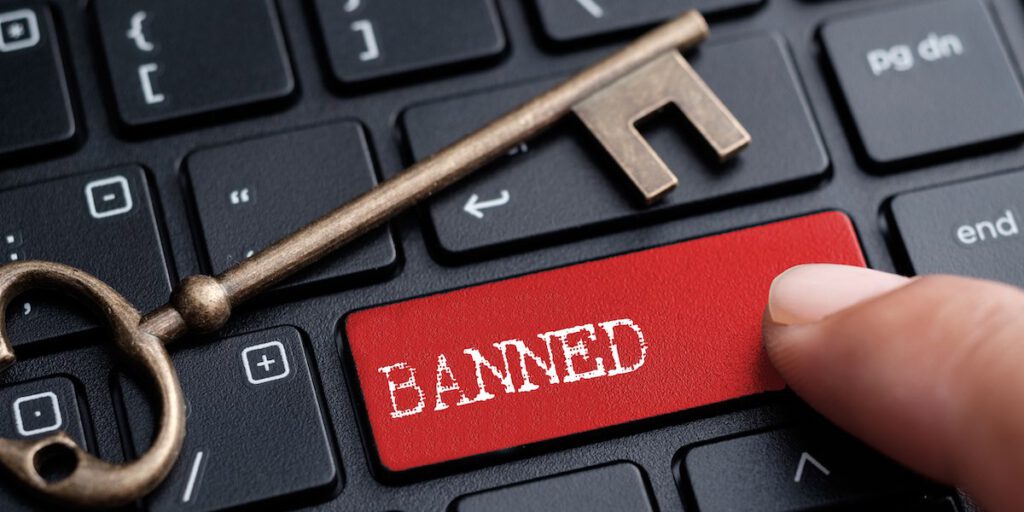Will Stricter Gambling Regulation Push Slots Players To The Black Market?

The black market is a contentious issue in the debate around gambling law reform in the UK. Whilst there is no doubt that it exists, the size and the extent to which it will grow is hotly contested. The industry says proposed affordability checks and stake limits on online slots will drive customers to play at unsafe sites, exacerbating problem gambling and taking money and jobs out of the economy. Those backing reform say the threat is exaggerated.
In this article we examine the research and discuss the possible impact of a new gambling act on the unlicensed gambling market.
The Background – Expected Regulation In The UK
In response to concerns over problem gambling figures in the UK the government has proposed a new Gambling Act to bring outdated laws up to date for the digital age. You can read more about the proposed reforms in this article. The highlights include stake limits on slots of up to £15 per spin, affordability checks for losses of £125 per month or more, limits on wagering requirements, and a mandatory 1% levy on gross gambling yield for all operators to fund Research, Education and Treatment (RET).
The government white paper outlining these proposals was presented to parliament in April 2023 and consultations with all interested parties are on-going. A new gambling act is expected to follow in 2024, although whether there will be time in this parliament is not clear.
The Problem of Unlicensed Gambling Sites
Unlicensed gambling sites are unwelcome in the UK for a few reasons.
For consumers they are unsafe as they do not provide the same protection as sites operating under UK law. There are fewer responsible gambling tools, less checks against excessive gameplay, and fewer safeguards to protect player balances in the event of insolvency.
For the industry, they represent a threat to revenues as high value customers head to the black market casinos where bigger bonuses, games with quicker spin speeds and bonus buy options are available, and all without intrusive checks on the source of your funds.
And of course, they do not contribute to the economy. They pay no taxes and employ no one in the UK, and contribute nothing to problem gambling charities.
What Does Research In The UK Say?
Over the last 5 years the gambling industry, represented by the Betting And Gaming Council (BGC), has commissioned a series of reports on the popularity of black market betting sites in the UK in an effort to support the case against changes to gambling law.
Here is a summary of the most high profile reports and their findings.
Price Waterhouse Coopers Review of Unlicensed Online Gambling in the UK (February 2021)
This report by PWC aimed to provide an overview of all aspects of black market gambling in the UK including the number of active unlicensed operators, the accessibility of unlicensed sites, levels of awareness and usage, and motivation for using them. 2,363 online gamblers were surveyed for the research.
Highlights of the report included:
- Awareness of unlicensed operators amongst online gamblers was 44%
- Increase in unlicensed operator usage from 2.2% to 4.5%.
- Stakes on unlicensed sites increased from £1.4 billion to £2.8 billion
In conclusion, PWC said that they found ‘evidence for the existence and growth of unlicensed online gambling sites in the UK.’ The report laid the foundation for the industry’s argument that a black market represented a genuine threat to licensed operators and the safety of online gamblers in the UK.
However, the report was questioned by the Gambling Commission, whose Chief Executive at the time, Neil McArthur, said its conclusions were inconsistent with their own research. Read more in this Guardian article.
Price Waterhouse Coopers Review of Unlicensed Online Gambling in Europe (February 2022)
A year later and another report from PWC commissioned by the BGC sought to reveal the extent of online gambling at unlicensed sites across other regulated markets in Europe.
Highlights of the report included:
- France – where there is a state monopoly on online gambling 57% of stakes are through unlicensed sites
- Norway – with affordability checks, and tight restrictions on stakes and advertising, 66% of stakes are through unlicensed sites
- Spain – where strict laws prohibit gambling advertising 20% of money staked is on unlicensed sites
PWC concluded that, “Whilst it is not possible to isolate the impact of individual regulatory characteristics, the assessment suggests that jurisdictions with a higher unlicensed market share tend to exhibit one or more restrictive regulatory or licensing characteristics.”
Yield Sec Report On The Scale of Black Market Gambling in the UK in 2022
This report, announced by the BGC on their website, examined the extent of visits and spend at unlicensed online gambling sites with particular focus on specific events like Cheltenham racing and the World Cup in Quatar.
Highlights of the report included:
- During the Quatar World Cup (December 2022) 250,000 punters visited unlicensed betting sites, compared to 80,000 in December 2021
- This coincided with an 83% increase in visits to sites that are not part of the UK’s safer gambling Gamstop program that enables problem gamblers to self-exclude from ALL licensed sites from one place
- The number of visits to unlicensed gambling sites increased by 46% in 2022
Yield Sec concluded: “This trend of increased illegal gambling activity during prominent sporting events reflects the ever-present threat that illegal operators pose to players and the audience.”
Can The Research Be Trusted?
The BGC are working hard to protect their revenues by highlighting the findings in reports like these and lobbying of MPs.
But where the research comes from an organisation with a vested interest in one side of the argument, can we trust it?
Supporters of prohibitive regulation say not. One of the most high-profile campaigners for reform, Labour MP Carolyn Harris, had this to say back in 2021:
“The online gambling industry talks up the threat of the black market in an attempt to resist regulation and protect its profits, but trying to hijack the debate by manufacturing dodgy dossiers of information to further their own ends is an incredibly transparent tactic and will not be any kind of excuse to hold down standards.”
And Neil MacArthur, formerly of the Gambling Commission questioned the research methods of PWC at the time, saying they had failed to exclude bots and automated systems when they assessed usage of unlicensed sites.
It’s true that at times the BGC can certainly appear disingenuous. In a statement following the publication of the Yield Sec report in 2023, they claimed that players can sign up with black market sites in less than 30 seconds, compared to 12 minutes at licensed sites. Perhaps they went off to make a cup of tea halfway through their sign-up.
Elsewhere, the Gambling Commission have sought to challenge the narrative put forward by the industry, saying that the impact of financial risk checks and stake limits will be limited because they will only affect a small number of consumers. In November 2023 in an open letter to the Racing Post about the impact of affordability checks, current head of the Commission, Andrew Rhodes said that their own research suggested that only 3% of accounts would be subject to checks, and only 0.3% would be subject to the kind that require the customer to share their pay slips or bank details.
Can We Learn From Other Markets?
We don’t know for sure how gamblers will react when new laws are introduced. The BGC say that the black market is already growing and predict it to become a more serious threat whilst the Gambling Commission say this is an exaggeration and the impact of reform will be limited.
So, can we look at other regulated markets for empirical evidence of what might happen after the new gambling act?
Reports on the growth of black-market sites in Germany and Denmark are useful in this regard.
Germany
In October 2023 iGaming Business reported from Germany’s annual Federal Conference on Gambling. The market there has been fully regulated since the Interstate Treaty on Gambling (ISTG) was introduced in 2021 and the impact has been significant.
The ISTG brought in extremely tough measures including a 1 euro stake limit for online slots and a 1,000 euro / month deposit limit.
One representative from a license holder, Rootz, reported an 80% fall in average deposits per player, saying, “they haven’t stopped gambling and found another hobby”, clearly implying that gamblers who wanted to spend more than the limit allowed were going to the black market.
Interestingly, in the same report, iGB say that the industry in Germany has been impressed by the way in which the UK has approached changes in the law with affordability checks providing personalisation and flexibility in one of the most contentious areas. It says, ‘the Gambling Act white paper is held up as a successful, collaborative and proportionate model for fine-tuning gambling regulation.’
Denmark
Another useful piece of research came in January 2024, when iGB reported further research by the Danish regulator, Spillemyndigheden, which showed that whilst the black market there is small – just over 2% – consumers most consistently said that the draw of those sites was the higher bonuses on offer (25% said they played for this reason) and broader range of games (39% for this reason).
This is important because alongside affordability checks and restrictions on stakes, the government white paper recommends limitations on bonuses and wagering requirements at UK-licensed gambling sites. Offers like 100% up to £300 which can be found on some slot sites right now may no longer be available under new laws.
Conclusions
The debate over regulation continues. And whilst the industry continues to rail against affordability checks – to be debated in parliament on the 26th February – their introduction seems inevitable alongside further limits on stakes on slots and bonuses. It also seems inevitable that some players will move their time and money to black market sites. However, we should take the industry-sponsored research in this area with a pinch of salt. The path to regulation in this country is more balanced and provides more flexible solutions that seen in other markets, like Germany for example, so perhaps the impact of a new gambling act will not be as severe as some are predicting.




